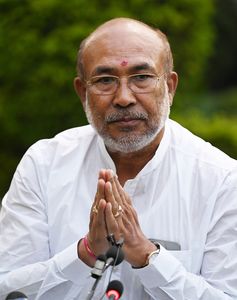Biren Singh’s resignation was driven by two immediate factors: the Supreme Court’s admission of a petition that accused him of having a role in the Manipur violence, and a growing lack of support within the BJP, with 18-20 MLAs, according to one estimate, not ready to back him in the face of a no-confidence motion. Over the long term, his populist politics, which centralised decision-making and prioritised Meitei interests, created deep rifts, especially with hill tribal communities like the Kuki-Zomi-Hmar group. His policies on land access and government job reservations further alienated these groups. Public protests by thousands of Meira Paibis demanding his resignation signalled that he had lost public trust.
His leadership position became untenable because the tension inherent in this populist politics unravelled and culminated in a kind of false expectation from people who are blindly following his tall promises of securing Manipur’s territorial integrity and false hope of securing access to and control over lands in tribal hill areas. He had to resign to salvage the BJP’s image and to possibly facilitate the only honourable exit.
Initially the political leadership in New Delhi thought his populist politics, centred on the revival of Sanamahism, an indigenous religion, was amenable to appropriation by the right as a larger civilisational project. But, its rise fuelled tensions, strengthening armed militant movements with secessionist agenda in the valley. The reactivation of insurgency, reversing gains since 2004’s Operation All Clear by the Indian Army, posed a grave national security threat, which, along with ground-level intelligence reports, likely influenced the BJP leadership’s decision to distance itself from Singh.
Although Singh successfully co-opted former rivals like Biswajit Singh and Govindas Konthoujam, his approach prioritised a majoritarian ultra-nationalist Meitei project and selectively targeted the Kuki-Zomi-Hmar group for posing a threat to the forest and demographic balance. Meanwhile, a new opposition force, including former IPS officer T. Radheshyam Singh, T. Satyabrata Singh, and Y. Khemchand, had begun to oppose Singh’s high-handedness and centralisation of powers. However, it remains to be seen how internal rivalries within these factions play out. The regime, even if it is president’s rule, faces a tough task in balancing interests and addressing demands without exacerbating existing tensions.
Manipur’s hill tribal communities feel their identity and rights have been undermined by weak political representation and ineffective protective measures, especially when it comes to jobs, land and resources. They argue that district councils, created under the 1971 Act, lack legislative, financial and judicial powers. Since 1974, they have been demanding an upgradation to Sixth Schedule status. Article 371C established the Hill Areas Committee (HAC) to protect tribal interests, but it has only recommendatory powers, making it ineffective. The HAC’s demand for greater authority, especially over forest rights, was evident in its March 2021 resolution asserting its right to vet bills on forest and other scheduled matters pertaining to the hill areas.
Tensions escalated in October 2022 when Singh’s government overturned exemptions granted to several villages by the assistant settlement officer under the Indian Forest Act. The demolition of a village in Churachandpur district in February 2023 which ensued from this agitated the Kuki-Zomi-Hmar groups and prepared the ground for violent confrontations. Tribals saw this as state overreach and an erosion of their customary rights, viewing the government’s action as being driven by a majoritarian, assimilationist agenda. Their struggle revolves around securing land ownership and maintaining control over traditional forest rights.
The prolonged violence has eroded public trust in state institutions, necessitating a sincere effort to restore their legitimacy. The government must move beyond electoral politics and majoritarian agenda, particularly those driven by ultra-nationalist groups, to establish lasting peace. Ignoring Manipur’s deep diversities or the nature of inter-community relations and trying to impose assimilationist projects which, effectively, drive the majoritarian agenda, thereby subserving electoral interests, is not likely to establish durable peace, order and stability.
A key issue is land control. The government must acknowledge historical claims and prioritise local ownership rights according to uti possidetis juris. This means granting substantive autonomy to tribal communities over their land and resources while also reforming the chieftainship system in the hills so that “local autocracy” of the chiefs is not perpetuated. As long as the communities are endowed with a sense of common ownership over their land and property, their attachment and loyalty to the land, and by extension to India at large, would remain intact.
Policymakers in New Delhi must honour the longstanding legal and constitutional protection given to tribal communities over their land and resources. Any attempt to sidestep the existing protective discrimination regime to appease the majority would risk further instability and stalemated conflicts.
The basis of future political dialogue should be exploring means of ensuring a more robust autonomy to tribal communities. Effective representation, redistribution, and inclusion within and between communities must be ensured. Dialogue for peace must be based on the foundation of mutual trust, respect and accommodation.
―As told to Namrata Biji Ahuja
Kham Khan Suan Hausing is professor, department of political science, University of Hyderabad.




